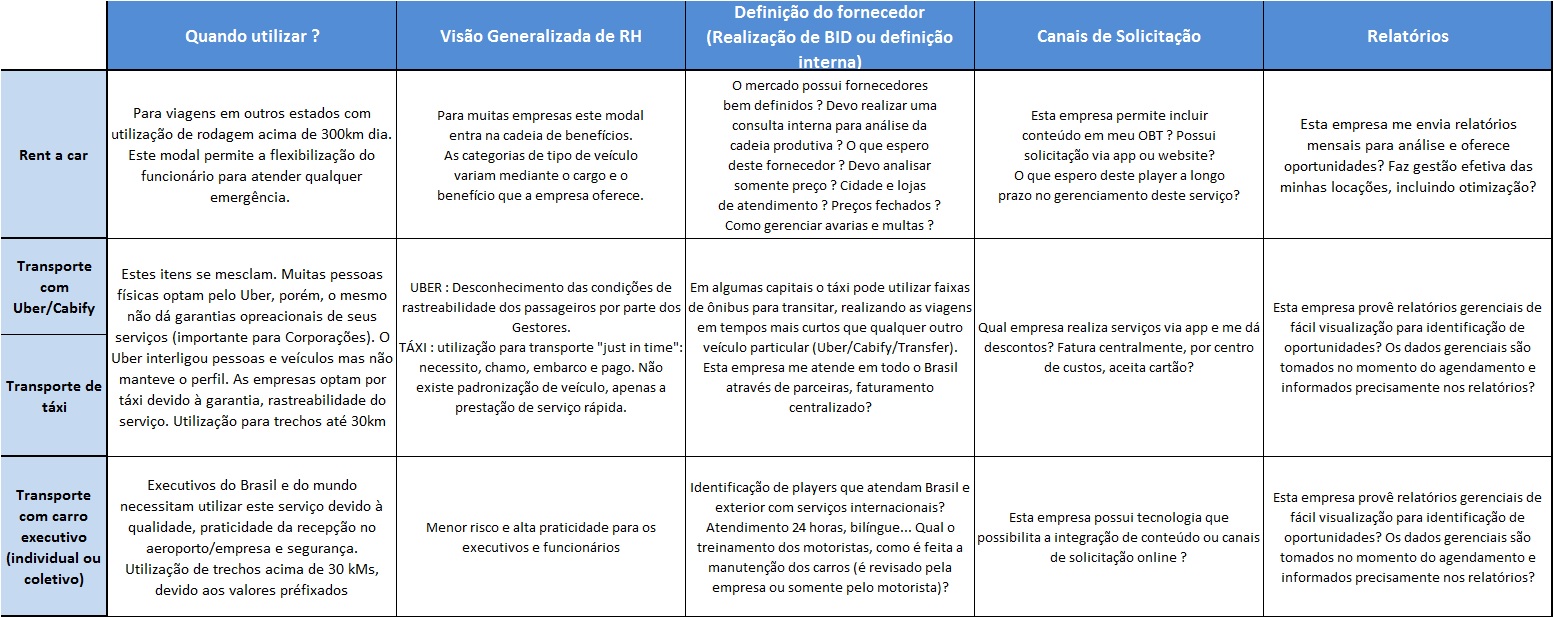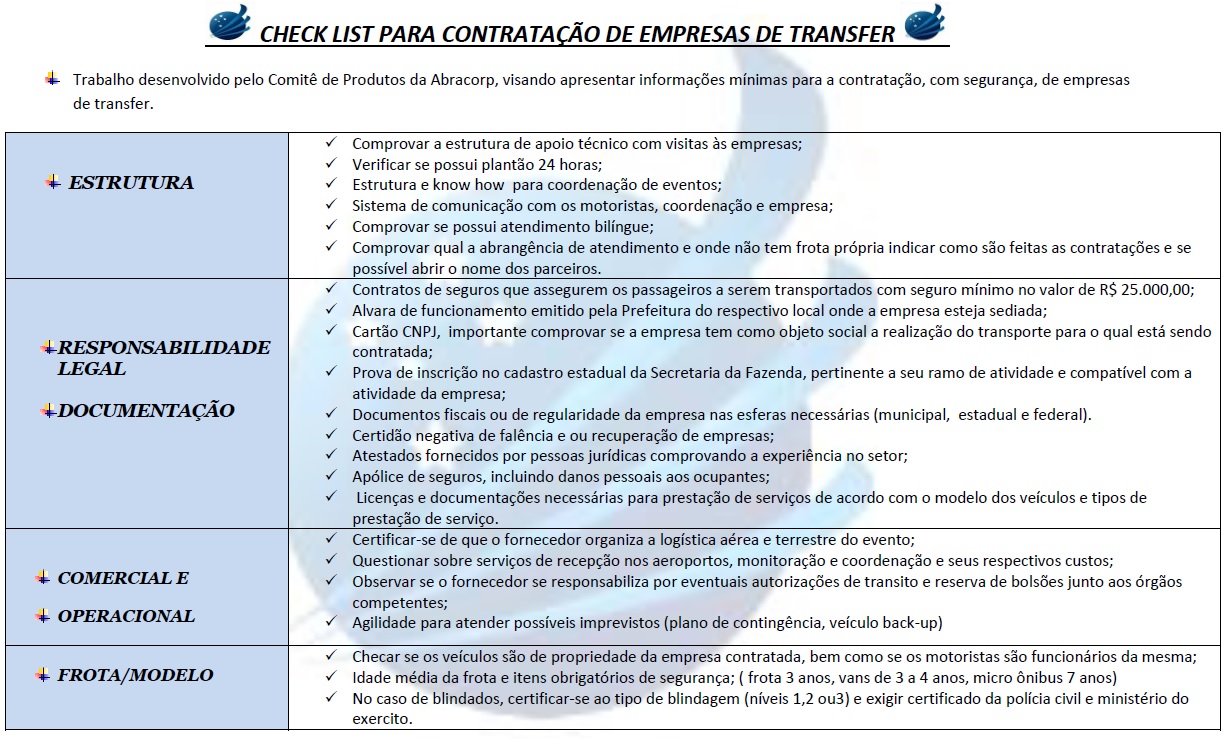Amigos e Colegas Leitores,
Vai chegando ao final o primeiro quarter do nosso ano. Com ele teremos o Account Review de nossas TMCs e outros fornecedores, revisão de orçamento, de caps e correção de algumas táticas e estratégias – já com um pouco mais de ideia do que será 2017. Março foi um mês alucinante, com a sensação de que tudo que ficou represado em Janeiro e Fevereiro começou a acontecer nestes 31 dias.
No prestigiado Fórum Panrotas, destaco a apresentação encantadora , mas ainda incompleta, do AirBnB. Para nós, profissionais do Turismo Corporativo, todas as perguntas ficaram em aberto. Encantadora, e com mais sorte de não precisar responder nada, foi a apresentação do Rock in Rio (genial).
No Lacte, destaco a brilhante apresentação do Max Gehringer e a dica de que nós homens deveríamos sorrir para as mulheres ao nosso lado na mesa, pois elas seriam nossas chefes amanhã – nesta hora fiquei extremamente feliz de não ser a Dilma almoçando ao meu lado.
E em Abril? Bem, em Abril teremos a 1ª Conferência da GBTA em Curitiba, primeira conferência desta organização na região Sul. Mais informações em: http://www.gbta.org/AmericaLatina/Brasil/SobreNos/Pages/GBTAConferencia2017Curitiba.aspx
Também estaremos com a Academia GBTA em Brasília, dia 05/04, e em Fortaleza em 19/04. Vejo vocês lá!
Sobre a 1ª Conferência Nacional dos TMs, alteramos a data para 01/09/2017 e já comunicamos todos os contatos que temos por email. Haverá um evento em São Paulo em 17/08 que ano passado foi em Setembro, e não quisemos encher a agenda de todos com um evento no dia seguinte, 18/08.
Sobre o post de hoje…. bem, há algum tempo venho ensaiando escrever o texto abaixo, algo como uma carta de um(a) Travel Manager para um(a) viajante corporativo(a) de sua empresa (ou um(a) organizador(a) de viagens)… confesso que quando eu começava a escrever vinham tantos detalhes à mente que foi difícil expressar tudo e de uma maneira didática, para leigos. Acho que este post de Março é o ideal, até porque com os recentes eventos, fica difícil trazer novidades tão poucos dias depois e com um intervalo tão curto entre ambos.
Carta Aberta a um Viajante Corporativo (escrita por um Gestor de Viagens e Eventos)
*esta carta não é real! Apenas uma maneira didática de explicar aos viajantes corporativos os perrengues da vida de um Travel Manager dos dias de hoje.
Caro colega de empresa,
Sou o responsável pela área de Viagens de nossa empresa. Você me questiona bastante por e-mail, no café, no refeitório, no fretado em que nos encontramos, no fumódromo – ou através de seu chefe mesmo. A maioria de suas queixas são comuns a colegas de outras organizações, feitas pelos viajantes deles, pois a maioria de nossos desafios decorre do ambiente externo – ou seja, cada um em seu “quadrado” lida com as seguinte forças externas questionadas por vocês:
- por que encontra-se SEMPRE tarifas mais baixas comprando diretamente, fora dos canais oficiais que sou o responsável por administrar – e neste ponto sinto-me injustiçado, pois analisando o nosso volume de viagens estes casos não passam de 1% do total; mas você usa a palavra sempre quando conversamos;
- por que a agência oficial não é proativa, e muitas vezes limitada em seu atendimento (e a do seu amigo, claro, é muito melhor que a que a nossa empresa escolheu e que por coincidência do destino eu administro);
- por que os hotéis que negociamos não são bons em tarifa e serviços;
- por que a ferramenta interna de requisição de viagens (OBT) não é amigável como um site “normal”, da Booking ou da Decolar;
- por que precisam de tantas aprovações para viajar ou prestar contas.
Como meu cliente interno e colega de organização, deixe-me tentar explicar alguns fatos para ajudar a entender por quê estas coisas acontecem (embora não nos exima do fato de que somos responsáveis em melhorá-las – mesmo exigindo uma capacidade de coordenação e persistência enorme, além de ajustes hercúleos e alheios à nossa capacidade como melhora da infraestrutura do País, segurança jurídica, diminuição do custo-Brasil, etc:
1- Com a expansão do mercado, houve uma proliferação, e ainda há, de novas soluções e canais de distribuição (o que é ótimo, o capitalismo sendo o capitalismo). Os mercados da América Latina têm uma gama enorme de hotéis e a maioria deles é independente e com pouca estrutura para bancar a distribuição de suas tarifas via os tradicionais distribuidores globais, que são caros. Este “monopólio” dos distribuidores inclusive é um dos entraves que vem sendo alvo das novas soluções, que buscam distribuir as tarifas dos hotéis a um custo menor, mas tudo isto leva muito tempo e envolve muitos interesses comerciais e operacionais – são estruturas que regeram o Turismo por 60 anos e estão sendo desafiadas agora. Estamos no meio do furacão, aquela fase do mercado que as forças se chocam até que comecem a se acomodar.
Exemplo: quando uma agência reserva para você uma tarifa muito baixa, mas que é de uma agência online como Decolar, Booking, Expedia, ou de uma máquina como a Trend, os funcionários do Hotel não sabem de qual empresa você é – diferente de quando é uma tarifa da própria agência ou da nossa empresa (que chamamos de “tarifa corporativa” ou “tarifa negociada”). Elas geralmente são mais baratas porque estas empresas tem poder de negociação altíssimo ao congregar volumes, equipes gigantes focadas nisto – mas também muitas vezes têm armadilhas como não ser reembolsável, não poder ser cancelada, sem café-da-manhã incluso. Nosso grande desafio é conectar toda essa rede para chegar até você:
Hotel –> Distribuidor (GDS/HRS/Trend/Decolar/Booking/Expedia) –> Agência de Viagens/Online Booking –> Viajante –> Visibilidade pós-venda em relatórios
Com uma média de 200 Hotéis negociados ao ano pela nossa empresa + todos os outros que não são negociados, mas que utilizamos, imaginem a dificuldade de fazer este sistema funcionar. Tenho que fazer você ter acesso ao mais barato, mas também ao mais confortável e seguro. Isso falando de Brasil, mas alguns de nós também somos gestores regionais e temos exatamente os mesmos problemas na Argentina, Peru, Chile, Paraguai…. mercados muito mais imaturos, muitos Hotéis sem contatos comerciais ou que não estão nem aí para nosso volume – pois se vendem sozinhos ou simplesmente não tem apetite comercial.
2- Embora as viagens de negócios no Brasil, e provavelmente nos demais países, representem de 65 a 70% do volume das Cias. Aéreas, elas ainda pensam muito no usuário que compra no site, a pessoa física, para definirem regras tarifárias e formas de distribuição (chego a dizer em muitos casos que as internacionais também não estão nem aí para nós – mudam regras de compra de bagagem e marcação de assentos sem pensar em como isso será executado no turismo corporativo, sem apoiar em nada a mudança que estão provocando). Logo, vendem assentos em bloco para as mesmas agências online que mencionei anteriormente, mas não para as agências corporativas que nos atendem, ou publicam tarifas únicas para compra via website que não estão disponíveis para vocês via nossa agência de viagens nem via sistema interno da empresa. Mas da mesma maneira, estas tarifas raramente são remarcáveis, reembolsáveis, etc. Além disso, ao se avançar da primeira página das ferramentas mais famosas, percebe-se um aumento do preço inicial devido à taxa de serviço do site + taxas aeroportuárias.
Sim, viagens internacionais (especialmente) se não forem bem cotadas por um consultor experiente podem ser mais baratas no site devido a combinação de trechos, horários e “caça” de classes tarifárias nos inventários dos transportadores que os algoritmos conseguem fazer mais eficientemente (e isso não é privilégio apenas dos algoritmos de Viagens, leia qualquer reportagem de Inteligência Artificial para notar que isso já vem ocorrendo em outros setores da economia).
Até por isso pedimos em nossa Política que você compre com antecedência: há cada vez mais gente viajando no mundo, e menos voos sendo operados. Imaginem a quantidade de grupos sendo bloqueados neste momento que você lê meu post e pessoas buscando no Skyscanner ou outro metabuscador aquele assento que você quer comprar na classe econômica – é quase igual comprar ingressos pro Rock in Rio.
3- Geralmente aquilo que reclamamos de nossas agências, de falta de proatividade, retorno rápido e preços altos, faz sentido e ocorre em todos os países do mundo, especialmente com as grandes agências que massificaram o atendimento corporativo (e isso não é uma crítica, é a realidade). Por terem massificado elas tem estrutura financeira e operacional para suportarem nossas empresas em diversos Países. Será que pagamos o justo a elas? É verdade que quem deve valorizar o produto é o vendedor, pois o comprador quase sempre vai querer pagar menos e ter mais – mas em alguns casos nossas empresas simplesmente esmagam os fornecedores com preços insustentáveis (e alguns estão errados em aceitar e baixar a régua). É verdade também que durante a contratação da agência existem níveis de serviço acordados e bônus e penalidades financeiras para eles, mas como querer ter um atendimento excelente pagando por um ruim? Não se esqueçam também que o nível educacional básico do nosso País/LATAM ainda é baixo e isso se reflete em todo o mercado; com isso, a profissão de consultor de viagens acaba sendo desvalorizada porque os salários são baixos, bem como a de recepcionista de Hotéis e outras funções operacionais dos nossos fornecedores de Viagens e Eventos. É um cenário perverso que gera turnover alto, gastos com treinamento das empresas para que estas pessoas troquem de emprego por R$ 200 a mais em seus vencimentos – e não estou julgando-as, cada um sabe das contas que vencem em seu mês.
Ainda falando de atendimento, também temos nossa parcela de culpa quando não somos claros em nossas necessidades de clientes, quando mandamos apenas emails e não usamos o velho e ainda útil telefonema para esclarecer dúvidas. Um feedback transparente e construtivo seu, como viajante, também ajuda o fornecedor a melhorar e a nos conhecer melhor – e não se esqueça de elogiar quando for justo!
4- As aprovações são mais que necessárias no País “do jeitinho”. Enquanto não aprendermos a lidar com o dinheiro da empresa como se fosse o nosso, enquanto não pararmos de infringir regras por saber que ninguém está acompanhando seu cumprimento (geralmente nós Gestores fazemos auditoria por amostra), as aprovações excessivas continuarão existindo. Funcionários que extrapolam no cartão corporativo em jantares, que fazem a unha, cabelo , que usam táxi executivo, alugam carro de luxo ao invés do Econômico 1.4, ficam em Hotéis 5 estrelas e compram o voo mais caro tornam as aprovações necessárias – isso quando a empresa libera o cartão corporativo e não obriga as agências, locadoras e hotéis a trabalharem com uma coisa ultrapassada chamada faturamento – por quê é uma das poucas maneiras de não ter que ter uma equipe interna para controle e deixar a responsabilidade na mão do fornecedor, que só vai faturar aquilo que foi previamente acordado, correndo o risco de nunca receber se faturar o que não devia. É verdade que também usamos o faturamento para melhorar a gestão do caixa, afinal temos que entregar resultados para a Matriz, mas essa prática gera muita improdutividade e tira dos fornecedores fôlego financeiro para investir em aperfeiçoamento tecnológico e humano.
5- Nossa empresa muitas vezes não vê valor em gerir Viagens Corporativas estrategicamente e me dá diversas categorias para negociar/administrar, como Frota, Restaurantes, Jardinagem, Almoxarifado, Correios, Benefícios, etc. Também não me libera para ir a eventos do setor, acha que vamos apenas bater papo e que não trarei novidades para melhorar o serviço dos fornecedores para vocês, ou os processos e as regras de Viagens. Ou simplesmente não tenho tempo para ir, pois é tanto trabalho, tanta emergência, que fica “chato” sair do escritório enquanto minha equipe ou colegas ficam no olho do furacão. E bem naquele dia que resolvo ir, 10 pessoas ligam em minha mesa, não me acham e já perguntam para o chefe onde estou.
P.S: enquanto em outras categorias gerencia-se 10, 20 fornecedores, posso ter até 100 (considerando redes de Hotéis, propriedades independentes, Cias. Aéreas, Agência de Viagens, de Eventos, Locadoras de Veículos, Seguro-Viagem, Ferramenta de Reservas, Despachante, Distribuidor de Conteúdo de Hotéis, etc).
Mesmo com estas dificuldades que te listei (faltam muitas, mas claro que todo profissional especializado tem as suas), o fato é que comprar tudo de forma centralizada ainda é a melhor estratégia ao invés de deixá-los comprar sozinhos, cada um em sua agência ou site de preferência (ou você também quer comprar o grão da máquina de café, o papel higiênico, computador, mesa, cadeira, plano de saúde, o almoço de todo dia?). Preciso ter visibilidade para negociar melhor, para cobrar respostas dos fornecedores e para saber onde você está se ocorrer um atentado terrorista, uma enchente, um furacão. Sou responsável por suportá-lo nestes casos. Sou responsável por diminuir ou no mínimo manter sob controle os custos de viagens, e não olhar apenas o custo-viagem, mas o ganho que elas trazem aos nossos negócios (uma viagem menos cansativa e mais inteligente logisticamente te torna mais produtivo para fechar novos contratos, para o nosso presidente adquirir um novo negócio, para o advogado da empresa nos representar bem em uma audiência, para um trainee sair ainda mais motivado e preparado para logo ser um dos nossos Gerentes e para o Diretor de Relações Governamentais conseguir a aprovação de um projeto, portaria, lei que beneficie nossa indústria).
É isso meu caro viajante. Queria apenas te contar um pouco como é meu dia e por que nem sempre conseguimos (meus fornecedores e eu) atender ou superar suas expectativas, embora nos esforcemos muito. A parte boa é que o pessoal dessa indústria costuma ser muito apaixonado pelo que faz, se esforçam para superar as dificuldades – especialmente o pessoal da Hotelaria.
Um abraço,
Seu Gestor de Viagens e Eventos.
ENGLISH VERSION
Dear Friends and Colleagues ,
The first quarter is finishing. With it we will have the Account Review of our TMCs and other suppliers, budget review, caps and correction of some tactics and strategies – with a little more idea of what 2017 will be. March was an amazing month, with the feeling that everything that was dammed in January and February began to happen in these 31 days.
At the prestigious Panrotas Forum, I highlight the charming but still incomplete presentation of AirBnB. For us, Corporate Travel professionals, all the questions were left open. Lovely, and luckier for not having open questions was the presentation of Rock in Rio (great one!).
At Lacte, I emphasize the brilliant performance of Max Gehringer and the suggestion that we men should smile at the women next to us at the table, as they would be our bosses tomorrow – at this hour I was extremely happy not to be Dilma having lunch at my side.
And in April? Well, in April we will have the 1st GBTA Conference in Curitiba, the first conference of this organization in South Brazil. More information at: http://www.gbta.org/AmericaLatina/Brazil/SobreNos/Pages/GBTAConferencia2017Curitiba.aspx
We will also be attending the GBTA Academy in Brasilia on 05/04 and in Fortaleza on 19/04. See you there!
About the 1st National Conference of TMs, we changed the date to 01/09/2017 and we already communicated all the contacts that we have by email. There will be an event in São Paulo on 17/08 that last year was in September, and we did not want to fill everyone’s schedule with an event the next day, 08/18.
About the post today …. well, I’ve been rehearsing for some time writing the text below, something like a Travel Manager’s letter to a corporate traveler or travel organizer … I confess that when I started to write so many details came to mind that it was difficult to express everything and in a didactic way, for lay people. I think this March’s post is ideal, because with the recent events, it is difficult to bring news so few days later and with such a short gap between them both.
An Open Letter to a Corporate Traveler (written by a Travel and Events Manager)
*This letter is not real! It is only a didatic and funny way to illustrate to the general travelers and travel arrangers the overall difficulties of this professional in our region.
Dear colleague,
I am responsible for the travel area of our company. You question me a lot by e-mail, in the cafeteria, at the bus where we meet, at the smokehouse – or through your boss himself. Most of your grievances are common to my colleagues from other organizations, made by their travelers, because most of our challenges come from the outside environment – that is, everyone in your “square” deals with the following external forces questioned by you:
- Why do you ALWAYS find lower fares buying directly, outside the official channels that I am responsible for managing – and at this point I feel wronged, because analyzing our volume of travel these cases are no more than 1% of the total; But you always use the word “always” when we talk;
- Why isn’t the official agency proactive, and is often limited in its service (and that agency of your friend, of course, is much better than the one that our company chose and that by coincidence of the destination I manage);
- Why the hotels we deal with are not good at rates and services;
- Why the internal OBT is not user friendly like a “normal” website, from Booking.com or from Decolar;
- Why do you need so many approvals to travel or to claim for expenses.
As my internal client and organizational colleague, let me try to explain a few facts to help understand why these things happen (though it does not exonerate us from the fact that we are responsible for improving them – even requiring enormous coordination and persistence , besides Herculean adjustments and external to our capacity as improvement of the country’s infrastructure, legal security, cost-Brazil’s reduction, etc:
1 – With the expansion of the market, there has been a proliferation, and still, of new solutions and distribution channels (which is great, capitalism being capitalism). Latin American markets have a huge range of hotels and most of them are independent and have little structure to finance the distribution of their rates through the traditional, expensive global distributors. This “monopoly” of distributors is one of the obstacles that has been the focus of the new solutions, which seek to distribute hotel rates at a lower cost, but this takes a lot of time and involves many commercial and operational interests. They have been conducting Tourism for 60 years and are being challenged only now. We are in the middle of the hurricane, that phase of the market that forces collide until they begin to settle.
Example: when an agency reserves for you a very low rate, but that is from an online agency like Decolar, Booking, Expedia, or a company like Trend, Hotel employees do not know which company you are from – different from when Is a rate of the agency itself or our company (we call it “corporate rate” or “negotiated rate”). They are generally cheaper because these companies have very high bargaining power when assembling volumes, giant teams focused on this – but also often have pitfalls such as not being refundable, can not be canceled, without breakfast included. Our big challenge is to connect the whole network to reach you in the OBT or via the agency:
Hotel -> Distributor (GDS / HRS / Trend / Travel / Booking / Expedia) -> Travel Agency / Online Booking -> Traveler -> Visibility in travel management/ finance reports
With an average of 200 hotels negotiated a year by our company + all others that are not negotiated, but we use, imagine the difficulty of making this system work. I have to make you have access to the cheapest, but also the most comfortable and safe hotels. That is speaking of Brazil, but some of us are also regional managers and we have exactly the same problems in Argentina, Peru, Chile, Paraguay … much more immature markets, many Hotels without commercial contacts or that do not care for our volume – because they sell alone or simply have no commercial appetite.
2- Although business trips in Brazil, and probably in other countries, represent 65 to 70% of the volume of airlines, they still think a lot about the user who purchases via their website, the individual, to define fare rules and forms of distribution (I have to say in many cases that the international ones do not give a damn about us either – they change baggage rules and seats bookings without thinking about how this will run in corporate travel, without supporting the change they are causing at all). So they sell block seats to the same online agencies I mentioned earlier, but not to the corporate agencies that serve us, or publish unique rates for purchase via website that are not available to you via our travel agency or via the internal company system . But in the same way, these rates are rarely remarkable, reimbursable, etc. In addition, by advancing from the first page of the most famous tools, you notice an increase in the initial price due to the service fee of the site + airport taxes.
Yes, international tickets (especially) if not well-priced by an experienced consultant may be cheaper on the site due to the combination of schedules, rules and fares in carrier inventories that the algorithms can do more efficiently (and this Is not only a privilege of Travel algorithms, read any Artificial Intelligence report to note that this has already occurred and is occuring in other sectors of the economy).
That’s why we ask in our Policy that you buy in advance: there are more and more people traveling in the world, and fewer flights being operated. Imagine the number of air groups being blocked at this point that you read my post and people searching on Skyscanner or another metasearcher that seat you want to buy in economy class – it’s almost like buying tickets for Rock in Rio.
3- Generally what we complain about from our agencies, lack of proactivity, slow responses and high prices, makes sense and occurs in every country in the world, especially with the big travel agencies that have mass-sized corporate services (and this is not a criticism, it’s reality). By having mass-sized, they have the financial and operational structure to support our companies in different countries. Do we pay the fair to them? It is true that the seller is the one who should value the product because the buyer will almost always want to pay less and have more – but in some cases our companies simply crush suppliers with unsustainable prices (and some are wrong to accept and lower the bar) . It is also true that during the hiring of the agency there are agreed levels of service and bonuses and financial penalties for them, but how do you want to have excellent service paying for a bad one? Do not forget also that the basic educational level of our Country / LATAM is still low and this is reflected in the whole market. With this, the profession of travel consultant ends up being devalued because the wages are low, as well as the receptionist of Hotels and other operational functions of our suppliers of Travel and Events. It is a perverse scenario that generates high turnover, expenses with training of the companies so after that these people exchange of company for $ 200 more in their salaries – and I am not judging them, each one knows of the bills that expire in their months.
Still talking about service, we also have our share of guilt when we are not clear in our needs as customers, when we send only emails and we do not use the old and still useful phone call to clarify doubts. Transparent and constructive feedback from you, as a traveler, also helps the supplier improve and get to know us better – and do not forget to praise when it’s a good service/product!
4- Approvals are more than necessary in our South Hemisphere countries. Until we learn to deal with the company’s money as if it was ours, while we do not stop breaking rules by knowing that no one is following up on them (usually we do sample audits), excessive approvals will continue to exist. Employees who extrapolate on the corporate card at dinners, who go to the hairdresser, who use executive taxi, rent a luxury car instead of Economical 1.4, stay in 5 Star Hotels and buy the most expensive flight make approvals necessary – this when the the company releases the corporate card and does not oblige agencies, rental car companies and hotels to work with an outdated billing device – because it is one of the few ways to not have to have an internal team to control and leave responsibility to the supplier, who will only bill what was previously agreed, running the risk of never receiving if they bill what they should not. It is true that we also use the billing to improve cash management, after all we have to deliver results to the HQ, but this practice generates a lot of unproductiveness and draws from the suppliers financial breath to invest in technological and human improvement.
5- Our company often does not see value in managing Corporate Travel strategically and gives me several categories to negotiate / manage, such as Fleet, Restaurants, Gardening, Warehousing, Post Office, Benefits, etc. It also does not release me to go to travel industry events, think that we will just chat and that I will not bring news to improve the service of suppliers for you, or the processes and rules of Travel. Or I just do not have time to go because it’s so much work, so many emergencies, that it gets “embarassing” to leave the office while my team or colleagues get in the eye of the hurricane. And right on that day that I decide to go, 10 people call my desk, they do not find me and they already asked the boss where I am.
PS: while in other categories 10, 20 suppliers are managed, I can have up to 100 (considering hotel chains, independent properties, Airlines, Travel Agency, Events, Car Rental, Travel Insurance, Reservations Tool, Dispatcher, Hotel Content Distributor, etc.).
Even with these difficulties that I have listed (many are missing, but of course every professional has their own ones), the fact is that buying everything centrally is still the best strategy rather than letting you buy yourselves in your preferred agencies or websites (or do you also want to buy grain from the coffee machine, toilet paper, computer, desk, chair, health plan, the lunch of every day?). I need visibility to negotiate better, to charge responses from suppliers and to know where you are if a terrorist attack, a flood, a hurricane occurs. I am responsible for supporting you in these cases. I am responsible for decreasing or at least keeping travel costs under control, not just looking at the cost-trip, but the gain they bring to our business (a less tiring and logistically smarter journey makes you more productive to close new contracts , for our president to get a new business, for the company attorney to represent us well in an audience, for a trainee to go out even more motivated and prepared to soon be one of our Managers and for the Director of Government Relations to get approval for one Project, ordinance, law that benefits our industry).
That is it my dear traveler. I just wanted to tell you a little bit more about what my day is and why we can not always (my suppliers and myself) meet or exceed your expectations, even though we try hard. The good part is that the people in this industry are very passionate about what they do, they strive to overcome the difficulties – especially the Hotel people.
Yours sincerely,
Your Travel and Events Manager.








